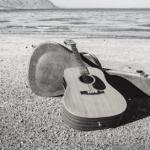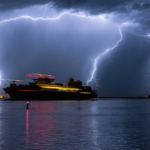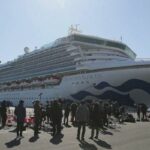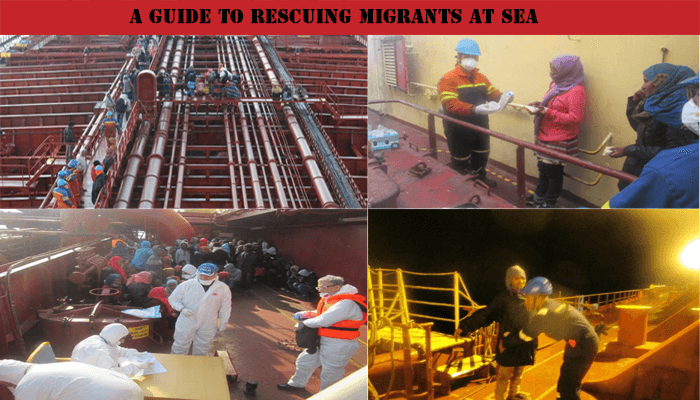What is Seasickness And How to Tackle it?
Travel sickness, also known as motion sickness, is indeed not a life-threatening condition. But, of course, it has the power to spoil your journeys.
As we all know, motion sickness is a very common illness caused by repeated unusual movements during travelling.
Resulting from the imbalance between the body’s sensory parts, motion sickness causes the symptom of feeling nausea, sweating and headaches, among others. In short, it is capable enough to ruin your trip, be it a short or long one.

Similarly, seasickness, which is a form of motion sickness, is perhaps the most common sickness to hit any person while at sea. Seasickness is a condition wherein the motion sense of the vestibular system and the motion perceived visually do not concur, causing nausea, fatigue and dizziness etc.
Seasickness is very common in first-time passengers of any ships or boats or even ferries. This problem has roots in the signals to the brain and therefore should be dealt with a great sense of care and interest. However, the problem lays in motion, therefore, ones the motion stops the patient slowly returns to normal.
What causes seasickness?
As said earlier, seasickness occurs due to the imbalance of the sensory parts of the human body. Broadly speaking this sickness is of three kinds – a motion is felt but not seen, a motion is visible but not felt at the time, and finally, the third kind where both the problems occur simultaneously.
When you travel onboard the ship, the motion distracts the messages from your eyes, inner ear and muscles to your brain that allows your body to know how it is moving. The moving ship competes against the human body’s natural proclivity for balance, resulting in dizziness, nausea, vomiting and headache etc. And, unlike other medical conditions, in seasickness, the resulting vomiting does not relieve the nausea feeling.
Other than this, the seasickness can also be caused by strong smells, be it bad or pleasant, and also by watching other people getting sick, says seafarers. Moreover, the consumption of alcohol and a heavy meal during the voyage also often become the reason for the illness. And, surprisingly, many claims that 99% of seasickness is mental and it has a psychological aspect.
Many suggest that most of the passengers, especially the first-timers, usually experience the discomfort within the first 48 hours at sea, i.e. during the time which they acquire the ability to walk steadily on the deck of a ship, which is also known as the sea legs.
And, there are no proper explanations for how long does it last if one experiences it, or even for how many journeys it will take one to come in terms with the illness and to predict the possibility of having seasickness in a particular journey.
Remedies for seasickness
The medicines that have been developed for the treatment of motion sickness or seasickness so far have seen mixed success. In any case, the medications that have so far been introduced have had varied results; it suited some whereas it did not suit the others.
The medicines that are usually prescribed by doctors- including Bonine, Antivert, Dramamine- have proved effective for people as a preventive measure for short journeys, and also for mild cases of motion sickness.
One of the most popular medications is the patch, which contains scopolamine that is used to place behind the ears before setting on the voyage. If a need arises it should be changed every 72 hours. This method of dealing with seasickness is effective but leaves the person very thirsty. So choosing between thirst and sickness is a choice to be made in this case.
In the case of seasickness, the age-old adage, prevention is better than cure fits the hilt. The best way to deal with the illness thus is by preventing it from affecting you in any manner.
The prevention starts with the diet. One day prior to setting sail onboard a ship, one must adhere to non-spicy food and completely avoid all kinds of fats and acidic foods like fast foods. In addition to avoiding the big meals, the consumption of caffeine and alcohol also needs to be controlled.
Sometimes, as mentioned earlier, over-the-counter motion sickness medications, the medicines with Meclizine or Dramamine or Bonine ingredients also can act as a preventive tool. The recommended dose is 1-2 tablets about a couple of hours prior to getting on board.
Though this medicine makes one a bit drowsy, it is very effective. Sometimes oils act as medicines like the motion Eaze oil. It is meant to be applied behind the ears when the problem arises. The best part is that it has no side effects.
Apart from this, ginger is a fantastic solution to this problem. One can drink ginger tea or chew on it or suck it. Carrot juice, apricot juice, citrus, mints and parsley are also said to have healing properties regarding these problems.
Some other remedies include listening to music, using a fan, relaxing by lying down and closing the eyes would help. And, looking out of the ship’s window or spending as much as possible time on the deck to witness the horizon also considered as activities to prevent the illness.
The selection of cabin is also important since the lower and more centrally located rooms experience less exposure to seasickness, while balcony stateroom is a better option always.
It has also been suggested that choosing ships with state-of-the-art stabilizers would help people who are prone to motion sickness. This facility helps passengers to do not feel the movements of the vessel and thus help them to avoid the symptoms of seasickness.
In addition, the trips that take more breaks in between are always a good option for people who are sensitive to motion. Fewer days at sea and more days at the ports give an option to get off the ship during proper intervals.
Seasickness is a problem that affects many but can easily be prevented. The only thing is that the person suffering should realize this soon.
Disclaimer: The authors’ views expressed in this article do not necessarily reflect the views of Marine Insight. Data and charts, if used, in the article have been sourced from available information and have not been authenticated by any statutory authority. The author and Marine Insight do not claim it to be accurate nor accept any responsibility for the same. The views constitute only the opinions and do not constitute any guidelines or recommendation on any course of action to be followed by the reader.
The article or images cannot be reproduced, copied, shared or used in any form without the permission of the author and Marine Insight.
Do you have info to share with us ? Suggest a correction
Related Posts
Subscribe To Our Newsletters
By subscribing, you agree to our Privacy Policy and may receive occasional deal communications; you can unsubscribe anytime.















